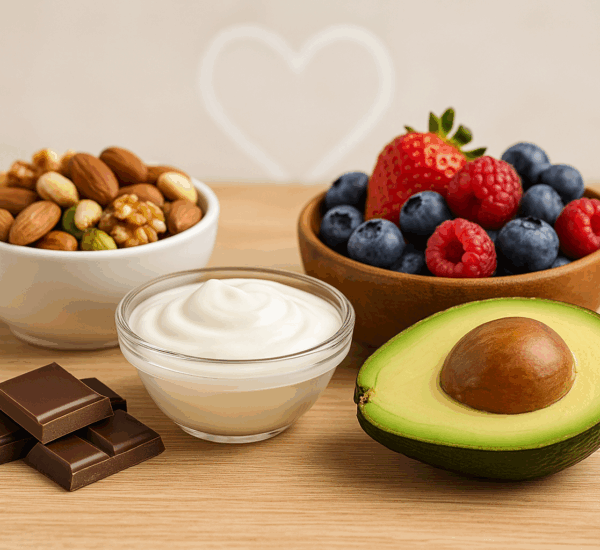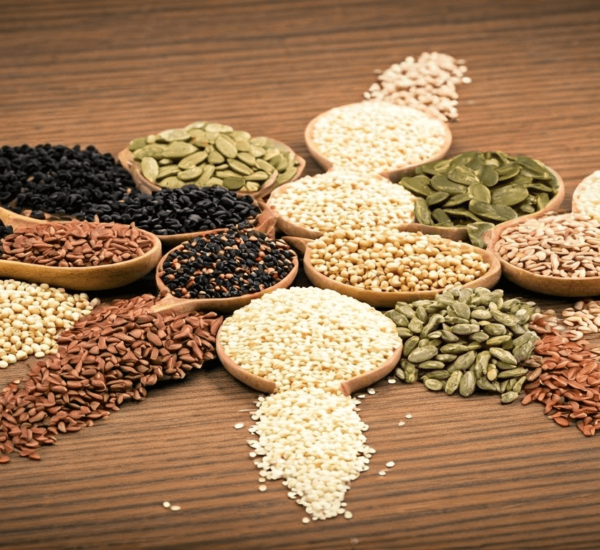Key Highlights
- Clogged arteries, called atherosclerosis, limit blood flow and raise the risk of heart disease.
- A healthy diet can be a natural way to help your arteries.
- Foods that have antioxidants, fiber, and healthy fats are very good for you.
- Adding these foods to a balanced diet can improve your overall cardiovascular health.
- Simple changes, like adding berries to your breakfast or eating nuts as a snack, can really make a difference.
Introduction
Heart disease, including coronary artery disease and coronary heart disease, is a big health problem. It often happens because of clogged arteries caused by a buildup of plaque and fatty deposits due to bad lifestyle choices. This issue is called atherosclerosis development. It happens when plaque forms inside the arteries. This plaque limits blood flow and can lead to serious heart problems. The American Heart Association emphasizes that while some people may need medication, eating a healthy diet can help a lot. It can greatly improve cholesterol levels and support artery health. This is a natural way to fight against heart disease.
Discover 7 Natural Foods That Cleanse Your Arteries
Keeping your arteries healthy is important for feeling good overall. When your arteries work well, blood can flow easily. This helps get nutrients and oxygen to every part of your body. Eating certain foods can really help support your arteries in a natural way.
Here are seven great foods that can help clean your arteries and boost your heart health.
1. Garlic
Garlic has a strong flavor and is famous for its possible health benefits. It’s especially known for helping the heart.
One of the great things about garlic is that it may lower blood pressure. High blood pressure is a big risk for heart disease. Studies suggest that when you eat garlic, it might help your blood vessels relax. This can improve blood flow and reduce stress on the heart.
Garlic also has compounds that fight inflammation and have antioxidants. These may protect your arteries from damage caused by free radicals, which is good for your overall heart health.
2. Nuts and Seeds
Nuts and seeds are excellent sources of protein and excellent for your health. They are full of healthy fats, fiber, and antioxidants. This makes them useful in reducing arterial plaque.
One of the main advantages of nuts and flax seeds is that they contain good fats. These are unsaturated fats, like monounsaturated and polyunsaturated fats. They can help improve cholesterol levels and enhance insulin sensitivity. If you swap out unhealthy saturated and trans fats for these better options, you can lower your risk of heart disease.
Also, the fiber found in nuts and seeds helps heart health. It works to lower LDL cholesterol, which is often called “bad” cholesterol.
3. Fatty Fish
Fatty fish such as salmon, mackerel, tuna, and sardines are famous for having a lot of omega-3 fatty acids, which can help lower triglyceride levels and reduce total cholesterol while increasing HDL cholesterol. These essential fats, along with extra virgin olive oil and tomato products, may also influence the expression of cellular adhesion molecules, which can help your heart in many ways.
Omega-3 fatty acids can lower inflammation, which plays a big role in heart disease.
When you add fatty fish to your meals, you help your cardiovascular health. You also get a healthy protein source that is good for your overall well-being.
4. Avocados
Avocados are loved for their creamy texture and rich taste. They are also good for your heart.
They are full of monounsaturated fats, just like olive oil. These fats can help raise good cholesterol levels and lower the risk of heart disease.
Avocados also have a lot of fiber. This fiber helps you feel full and can assist in managing weight. That, in turn, supports cardiovascular health.
5. Berries
Berries like strawberries, blueberries, raspberries, and blackberries are not just tasty. They are also strong antioxidants, like green tea, that can help keep your arteries healthy.
Their bright colors show that they have good compounds called anthocyanins. These are known to fight oxidative stress and inflammation.
Anthocyanins and other antioxidants in berries may help boost blood flow and lower blood pressure. This can support a healthy heart and blood vessel system.
6. Whole Grains
Switching from refined grains to whole grains is an easy and important step for a healthier heart.
Whole grains like oats, brown rice, quinoa, and whole-wheat bread are great sources of dietary fiber. This fiber is essential for keeping your arteries healthy.
It helps by grabbing onto cholesterol in your digestive system. This prevents cholesterol from entering your bloodstream and causing plaque buildup.
7. Leafy Greens
Leafy greens like spinach, kale, and collard greens are a good source of dietary nitrate intake and very good for you. They are full of vitamins, minerals, and nitrates, which help reduce your risk of cardiovascular disease and help your arteries stay healthy.
When you eat these greens, your body turns nitrates into nitric oxide, contributing to nitric oxide production. This molecule helps relax and widen your blood vessels. As a result, it improves blood flow and can lower blood pressure, similar to the benefits of dark chocolate.
Adding these greens to your meals every day can be great for your heart and overall health.
How These Foods Promote Arterial Health
The foods mentioned above have something in common. They are high in antioxidants, fiber, and healthy fats. These nutrients are important for keeping your arteries healthy.
They work together to fight inflammation, lower LDL cholesterol levels, improve blood flow, and stop plaque buildup. This helps keep your arteries clear and flexible, which is good for proper blood circulation.
The Role of Antioxidants and Omega-3 Fatty Acids
Antioxidants are common in berries, leafy greens, and other colorful fruits and vegetables, which are rich in beneficial plant compounds. They work like scavengers, getting rid of harmful free radicals in our bodies.
Free radicals can hurt the lining of arteries. This can make them more likely to have plaque buildup.
Omega-3 fatty acids are found mainly in fatty fish and some plants, like flaxseeds. These acids are known for reducing inflammation in the arteries. They also help stop blood clots from forming, which can cause heart attacks and strokes.
Dietary Fiber: Keeping Cholesterol in Check
Dietary fiber is found in whole grains, legumes, nuts, and seeds. It helps manage cholesterol levels, which is important for heart health.
When you eat fiber, it moves through your digestive system. It binds to cholesterol and stops it from being completely absorbed into your blood. This helps lower the amount of cholesterol in your body, especially LDL cholesterol. LDL cholesterol can cause plaque buildup in the arteries.
By managing cholesterol levels, dietary fiber helps protect your heart and arteries.
Incorporating These Foods into Your Daily Diet
Adding heart-healthy foods to your diet is easy. You can make simple changes that really help. Start by adding more fruits, vegetables, and whole grains to your meals.
Try out new recipes and flavors. This way, you can keep your meals fun and support your health for a long time.
Simple Meal Ideas for Heart Health
Here are some simple meal ideas to help improve your heart health:
- Breakfast: Oatmeal with berries, nuts, and a little honey on top.
- Lunch: A salad with grilled salmon or chicken, avocado, and mixed colorful veggies.
- Dinner: Lentil soup served with whole-grain bread.
- Snacks: A small handful of almonds, a piece of fruit, or a bowl of Greek yogurt with berries.
Don’t forget to use healthy fats like olive oil and avocado oil in your meals.
Tips for Sustainable Eating Habits
Making lasting changes to your diet takes time and focus on being sustainable. Don’t change your whole diet in one night. Instead, try to make small and doable changes over time.
Choose whole foods instead of processed ones and pay attention to how much you eat. It’s key to listen to when you feel hungry or full. By taking a balanced approach, such as following a Mediterranean diet, you can build healthy eating habits that help support your cardiovascular health and overall well-being.
Conclusion
In conclusion, adding natural foods such as garlic, nuts, fatty fish, avocados, berries, whole grains, leafy greens, and cruciferous vegetables to your diet, along with regular physical activity, can really be an effective way to help your arterial health and support healthy artery walls, which can prevent hardening of the arteries and address atherosclerosis risk factors. These foods are high in antioxidants, omega-3 fatty acids, and fiber. They can help keep cholesterol levels in check and clean your arteries naturally. If you choose these heart-healthy options and follow good eating habits, you will support your heart health. Subscribe to get more tips for a healthy heart!
Frequently Asked Questions
Can dietary changes alone clean arteries naturally?
A healthy diet is important for keeping arteries healthy and maintaining a healthy weight. Still, simply changing your diet probably won’t fully remove plaque buildup that is already there. However, eating a balanced diet, along with making some lifestyle changes and following disease control guidelines, can help slow down or stop more plaque from forming. This could lead to better overall health.
How often should I eat these foods for the best results?
For good heart health in the United States, try to eat these heart-healthy foods often. It is better to make them a regular part of your meals. Focus on being consistent and having a balanced diet. This can help to lower heart disease risk.
Are there any foods I should avoid to maintain arterial health?
To keep your arteries healthy and maintain optimal blood sugar levels, try to eat less food that is high in saturated and trans fats, cholesterol, sodium, and added sugars. These foods can raise blood pressure, increase high LDL cholesterol, and add to other risk factors for blocked arteries.
How quickly can I expect to see improvements in my arterial health?
You may not see changes right away, but sticking to a healthy diet can bring lasting health benefits. Better blood flow and other good effects usually happen slowly as you live a healthier life.
What dissolves plaque in the arteries?
There is no one food or natural cure that can quickly get rid of plaque in the arteries. The best way to keep your heart healthy is by sticking to a healthy diet and lifestyle. Always talk to a healthcare professional for advice that fits your needs.








